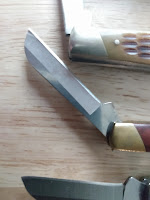Hollow Ground Blades Versus Flat Or Convex Blades
The truth about hollow grinding
I am going to jump right out in the beginning and offer this opinion, which is actually the fact:
There is no advantage to flat ground knives or convex ground knives unless one is using the knife as a froe for riving planks or shakes from a block of a tree round.
Why do I bring such a thing up?
I must have read 15 different forums with a hundred different people guessing, and they all got it completely wrong! How can so many people be so wrong for so long? These forums are internet age, and none of the discussions seem to have people who date back to the time when the purpose for hollow grinding was clear and EVERYONE understood the purpose! It is almost bizarre!
Why does hollow grinding exist?
It is simple. Hollow grinding has almost always been used in very high-quality knives and razors because it is easier to sharpen! As one sharpens the blade and gets past the initial wider part of the blade, the blade will become easier to sharpen and will very slowly become more difficult as the hollow grind becomes thicker up the blade. The concave offers hundreds of sharpenings made easier than convex or flat ground which always requires the removal of more metal to get to the required sharpness.
Why not hollow grind all knives?
It is just as I said, there may be some slight advantage for convex or flat ground blades when splitting out blanks or wooden shingles from a log, but otherwise, there is none! The slightly broader leading edge of a concave blade will cut through what is being cut without dragging against the upper portion of the blade, thereby offering less resistance and a route for excess fluid to escape if the purpose is fighting!
The reason hollow grinding was not used for standard knives was because it was much more difficult to accomplish! It required a separate, very accurate operation that took specialized equipment, and a good deal more time and expertise to accomplish! Flat grinding was used because it was cheaper!
Conclusion
In the end, and in the long run, hollow grinding is almost always superior to flat grinding except for very specific purposes! It provides cutting relief and it provides a much easier sharpening experience for a much longer time than flat or convex grinding!
Hollow Ground Blades Versus Flat Or Convex Blades? There is no contest and no real argument!
